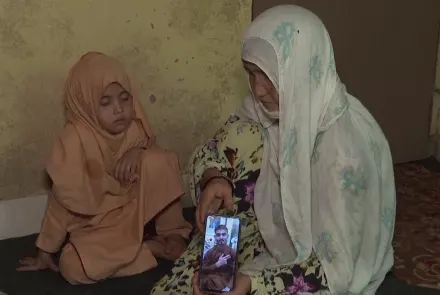Afghan immigrants in Pakistan asked the caretaker government of Pakistan to reconsider its decision regarding the expulsion of Afghan refugees. Some Afghan immigrants said that in recent days, Afghans with legal documents have been arrested by Pakistani police.
Bibi Laila, a 45-year-old Afghan woman, has been living in Pakistan for more than 40 years. Police recently arrested her 24-year-old son Attaullah, the oldest of her four children.
“(Police) arrested him although he had the identity document. If he has committed any crime, they should charge him. He has been arrested only for being an Afghan. If he didn’t have an identity document (issued by the Pakistan government) with him, it would have been understandable. We have documents that we obtained from the government after a lot of effort. But if we are arrested like this, what is the value of this document that I have in my pocket?,” said Qurban Nazar, the uncle of an arrested Afghan refugee.
“I appeal to the government to release all the refugees as early as possible. The government should make a policy for the Afghan refugees. It can’t be done without a clear policy. The refugees have been living here since 1979. Now the government wants us to leave, all of a sudden. How can we leave? People should be given at least three years so that they can properly wind up their businesses,” said Abdullah Shah Bukhari, a community leader for Afghan refugees.
“Pakistan’s deadline of 27 days started today. If they leave voluntarily during this period, it is better, otherwise they will be arrested and deported to their own country,” said Zaman Zaman, head of the Afghan refugee council in Karachi.
In the meantime, Amnesty International and the Human Rights Commission of Pakistan asked Pakistan to reverse its decision regarding the expelling of Afghan immigrants.
Responding to reports that the Government of Pakistan has ordered all unregistered Afghan refugees to leave the country by November 2023, Nadia Rahman, Amnesty International’s Interim Deputy Regional Director for research in South Asia, said: “They are living incredibly precarious lives where they are either having to undergo arduous processes for registering as refugees in Pakistan; or are stuck in lengthy processes waiting to obtain relocation to another country. A forced return to Afghanistan could put them at grave risk.”
“Amnesty International urges the government of Pakistan to continue its historic support for Afghan refugees by enabling them to live with dignity and free from the fear of deportation to Afghanistan where they face persecution by the Taliban,” said Nadia Rahman.
“It is unacceptable to hold them to account for the wrongs of a select few. They have a moral right to seek refuge in this country and to be treated with dignity and empathy. This decision also contravenes international human rights law and must be reversed immediately. HRCP intends to lobby strongly with the government for this decision to be reversed and for Pakistan to sign the 1951 Refugee Convention,” the Human Rights Commission of Pakistan said on X.
“The Human Rights Commission and Amnesty International’s statements and support regarding Afghan refugees in Pakistan should not be verbal, but the follow-up should be continued until the results and implementation of this issue,” said Asefa Stankzai, an activist for the rights of immigrants.
In the meantime, he consul of the Islamic Emirate in Karachi, Abdul Jabar Takhari, said that since the beginning of the deportation of Afghan immigrants, more than 100,000 Afghans have returned to Afghanistan.
“Since the crackdown on Afghans began, a large number of Afghans have left Pakistan and returned to the country, their number is more than 100,000,” Takhari noted.
Pakistan’s government announced a major crackdown Tuesday on migrants in the country illegally, saying it would expel them starting next month and raising alarm among foreigners without documentation who include an estimated 1.7 million Afghans.
The country’s caretaker Interior Minister Sarfraz Bugti said the crackdown was not aimed at Afghans and would apply to all nationalities, though the vast majority of migrants in the country are Afghans.










